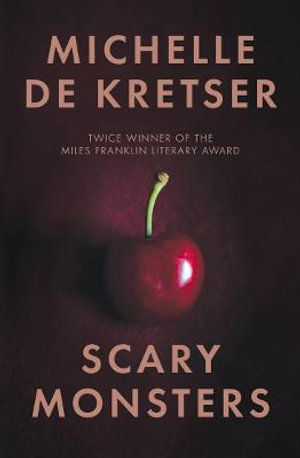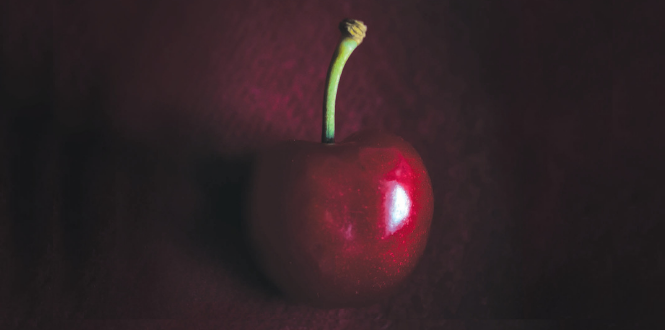A new Michelle de Kretser novel is always a cause for celebration. Twice the Miles Franklin Award winner, she is one of Australia’s most intelligent and fearless novelists. She always manages to tackle issues that others would find daunting, and yet her books deliver a light tone and fast narrative that they avoid disheartening the reader. The results are always extraordinary and rewarding. You find yourself carried along and the details accumulate as you go, until everything comes into a startling and unforgettable focus.
Michelle de Kretser’s latest, Scary Monsters, is a diptych of a book, being two narratives hinged together, with different cover images and tones but shared themes. One story is of the past, one of the future. You can read them in either order, (and I still ponder which is the best to start with, and if there is even a best choice at all). The voices and concerns of each piece seem so distinctly different that you wonder how they can share an author. It is the underlying concerns (of migration, memory and monsters) that tie them together, the sections being the before and after of our ‘now’, like the cover images of each; cherry blossom (past),and cherry fruit (future).
One story, ‘Lili’, is of the past, an emotional tale of a 22-year-old woman from Melbourne finding her feet as a language teacher in Montpellier, France in 1981. It tells of friendships tested, stereotypes failing, disillusionment and wonder as the country behind the postcards is revealed. Lili is of an unspecified Asian background, and her mixed ethnicity is soon both a magnet for racism and a token of the exotic to be celebrated. This side of Scary Monsters is beautifully evocative of its time, rich with textures and cultural detail in food, fashion, music, language and attitude. The young characters have a simplistic approach to life filtered through their stylistic ideas of France, complete with shallow and muddled existentialism and Marxism. But their keen enthusiasm and self-belief soon come up against the threats of class prejudice, bigotry, male-perpetrated violence and basic human hypocrisy.
There is some wonderfully descriptive writing in ‘Lili’, and the eponymous protagonist is a perfect mixture of yearning, hope and fear. It is impossible not to care for her as she tries to find her path betwixt her romantic ideals and uncomfortable reality. This is the very moving and human side of the book, and we love Lili’s playfulness and sensuality. We remember friends that were somewhat like hers, full of art, fire and passion. People of my age remember a world when we were twenty-two in the ‘80s; when our lives were set against game-changing political events and a new society seemed possible. Looking back is not all nostalgia. You remember the horrible lack of safety for women on the streets for one. With hindsight you also see chances squandered and errors born. You see the nuances, and the casual hatred of the other. You see misunderstandings and things you’d not really noticed at the time: misogyny, violence, racism and injustice. Such is Lili’s world.
Now flip to the book’s other side and you’ll find another story. ‘Lyle’ is told by a male narrator from Sydney and is a much colder experience. Lyle’s life is set in a dystopian future which is too much like our present, only slightly extrapolated. A judgmental and self-serving bureaucrat from the Department, Lyle believes himself to be an exemplary citizen and family man, responsible and even compassionate. He hates friction. He is trying to achieve what he is supposed to achieve in an Orwellian and sanitised society and is adept at looking the other way when required. He is naturally unbothered by the mysterious new viral outbreaks, the smoke-filled skies and the rural refugees of a society divided by inequity and environmental disaster. He looks forward always, avoiding complications from the past, including his immigrant background. Unfortunately his mother Ivy is both a complication and a symbol of the past. But there is the Amendment to help with that inconvenience.
The Lyle story is brilliantly observed socio-political satire at its best. At times, I found it reminiscent of Evelyn Waugh. It is beyond sharp, and with an infectious deep and dark humour that is laugh-out-loud. As she has done in past novels, de Kretser deftly skewers the hypocrisy of modern Australia; how we imagine ourselves to care about others in a land of the fair go, whilst actually actively marginalising.This novel savagely targets sexism, racism, ageism, Islamophobia, generational clashes, patronising no-policy politicians, corporate co-option, work performance fears, and social anxiety. The immigrant characters seek to be invisible except when it comes to acceptance, promotion, or love. It seems better to reinvent your life story, and accept the promise of white homogeneity and its dream career opportunities. All that sounds dire, but the author’s skillful touch keeps you securely nestled in the narrative, and thoroughly entertained by her lampooning of the familiar. The reader recognises Lyle, his family and colleagues immediately. We live in his world just a step before him and his is a world of our making. It is chilling stuff.
Scary Monsters, much like Michelle de Kretser’s previous novel, The Life to Come, is a dangerous and life-changing experience for the reader. The smooth edges of her graceful writing make you feel safe, but you get cut with precision all the same. The reader is confronted with questions about their own truthfulness, ethics, and complicity. Am I like Lyle? Is my day-to day more important than care of the sick and elderly? Am I like Lili and her friends? Do I see the mistreatment of immigrants and count my lucky stars that it’s not me as I look away? There are many scary monsters in this book, and some of them look like us. For the sake of expediency we fail to see how inequality and destruction is being built in front of us as we swallow political slogans and line up on our teams. We kid ourselves we got here on merit as we network and reinvent a more fluid identity to fit social needs. We balance the books by selling mineral commodities whilst paying lip service to climate change protocols. How do we feel about all this? Is it a case of “let’s not talk about that, what’s on TV”? Scary Monsters highlights an Australia that doesn’t like to look back, but isn’t too keen on looking forward either; a nation that fails to embrace reconciliation on so many levels. We prefer to look away.
For a book set in the past and the future, Scary Monsters is a contemporary novel in every sense of the word. It is a real right-here, right-now moment. A novel born from the lockdown times, it speaks of social control, geographic inequality, and splintering community rifts. This book is a much needed cautionary tale, a flawless mirror; and a moral medicine we should all take. No one writes like Michelle de Kretser. Her novels get into your head and stay there, changing you all the while. And book clubs could spend a year on this one! There are many sub-themes, inventive in-jokes and references, as well as the familiar de Kretser dogs and flowers. I love this book. Scary Monsters is an incredible and audacious creation; rich, deep, and dark. I urge you to read it. It will garner awards and all that, sure, but it is such a great read.
—Scary Monsters by Michelle de Kretser (Allen & Unwin) is out now. Limited signed copies are available while stocks last!

Scary Monsters
Limited Signed Copies Available!
Michelle de Kretser's electrifying take on scary monsters turns the novel upside down - just as migration has upended her characters' lives.
Lili's family migrated to Australia from Asia when she was a teenager. Now, in the 1980s, she's teaching in the south of France. She makes friends, observes the treatment handed out to North African immigrants and is creeped out by her downstairs neighbour. All the while, Lili is striving to be A Bold, Intelligent Woman like Simone de Beauvoir...
About the Contributor
Robert O'Hearn
Robert O'Hearn is the non-fiction specialist at Booktopia HQ. He has been a bookseller for over three decades and can't seem to stop. He is an aspiring apiarist and likes playing Joy Division songs on mandolin. He is generally harmless.
Follow Robert: Twitter








 Bestsellers: Scott Pape and Ash Barty continue to prove a hit with readers!
Bestsellers: Scott Pape and Ash Barty continue to prove a hit with readers!  Bestsellers: Jane Harper and Aunty Donna prove a hit with readers!
Bestsellers: Jane Harper and Aunty Donna prove a hit with readers!
Comments
October 20, 2021 at 6:38 am
I completely agree with what you have written. I hope this post could reach more people as this was truly an interesting post.
October 20, 2021 at 6:42 am
Thank you Hedin!